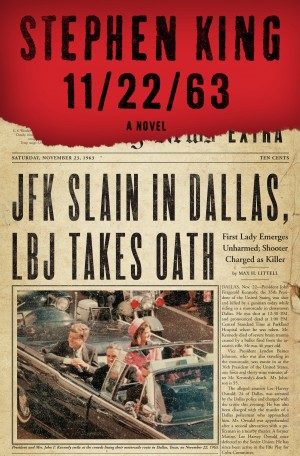Stephen King’s 11/22/63 is a New Spin on Time Travel Fiction
It goes without saying that Stephen King is known for his twisted tales of horror. However, his most recent novel, 11/22/63, does not fall under this genre. The story is odd enough without the usual components that tend to scare King’s readers out of their skin, and employs some elements of science fiction. 11/23/63, as its name suggests, is about time travel.
Jake Epping is a recently divorced high school English teacher. He has no children and seems to have little extended family, making him the perfect candidate for a dangerous job. Al Templeton, a Maine diner owner in the last stages of cancer, picks Epping to complete the mission he began before his illness—saving John F. Kennedy’s life.
Templeton has discovered a porthole in the pantry of his diner, and he has been traveling to 1958 and back for years, buying cheap hamburger meat and enjoying more flavorful root beer, until he realizes the way in which he believes the “rabbit hole,” as he calls it, is meant to be used. He thinks that saving President Kennedy will save the lives of Robert Kennedy, Martin Luther King Jr., and possibly, the lives of millions of people by the elimination of the USA’s involvement in the Vietnam War.
The task is more difficult than it seems. King changes the conventions of fictional time travel in 11/22/63. Epping cannot simply blink and travel to November 22, 1963 and polish off Lee Harvey Oswald. Going through the rabbit hole in Al’s Diner in 2011 brings the traveler to 11:58 a.m. in 1958 upon every voyage. Each visit wipes the slate clean. If Epping saves a life in 1958, and slips back through the rabbit hole to 2011, his alterations will stick. However, if he travels to 1958 again, all of his work will be undone. In addition, Epping can stay in the past for as many years as the mission requires, and come out in 2011, only two minutes from when he left. He will, however, have aged as many years as he lived in the past, coming back with the scars he earned there.
Besides these obstacles, the changing of the past takes a physical toll on Epping. Every time he is about to alter something big, he becomes ill, has car problems, or witnesses someone else being hurt in the process. Templeton came back to 2011 with lung cancer, and although he is described as perpetually dangling a cigarette from his mouth, one cannot be quite sure whether this was his assigned fate. “The past is obdurate. It does not want to be changed,” is a line that the dying diner owner left Epping with, and one he repeats to himself throughout his adventure. King seems to believe this as well. The impact of Epping in the lives of his 1958 friends and enemies is great. He takes a few lives, as well as saves some, and he can never be certain whether his mere presence might have somehow caused freak accidents that seem to happen all around him.
Given that Epping, or George Amberson (the alias that Epping takes while in the bygone days), has to wait five years in the past to change the state of the world, King’s novel is a heavy 842 page hardcover containing little action throughout. Epping begins to carve a life for himself in the early 1960s, one that he becomes more attached to than the one he’d been living before his adventure. While Epping’s falling in love, succeeding as an English teacher, and making friends in the one racism-free small town in 1958 Texas does serve to humanize his character, it does not make for the fast-paced, exciting story that time-travel fiction is by definition. But readers must remember that Jake Epping is not an equipped spy, and he is not a man that acts without thinking about the consequences, which are great, considering the ever-present butterfly effect.
King’s explanation of how preventing Kennedy’s assassination affects the world does not occur until near the end of the novel. The story is more about Epping’s effect on the lives of the people he becomes close with during the five years in which he is waiting to do the deed. A student in his class was badly scarred in a car accident, and Epping raises funds for her to have plastic surgery. Moreover, his support helps to sober up a student who is beginning to drink too much and he inspires jocks to act in school productions. King’s newest novel is about one man’s influence on those around him and less about that of a man who changes the past.
Though the novel is unnecessarily long, it is accessible. This is not a difficult read. King’s narration as Epping is easily conversational. Epping even stops to tell the reader a joke every now and then. Reading like a diary, it is supposed to be a manuscript that Epping has constructed during his trip. When addressing the reader, he often corrects himself with, “…if there ever is a ‘you,’” and the like.
While he is categorized as an author of horror novels, some of King’s most popular stories-turned-films include his novella, Rita Hayworth and Shawshank Redemption, the title shortened for film to just The Shawshank Redemption; The Green Mile; and The Body, which was re-titled for film as Stand by Me. While all of these stories circle around death, they are not typical of King, given his acknowledged forte. 11/22/63 stands with these works as an intricately weaved, death-centered work of fiction, but it is not quite up to par.
Still, the book explores concepts humans wonder about on a daily basis—is the past changeable, or is there such a thing as fate? Do our actions matter in the grand scheme of things? We will never find the true answers to these questions, but King’s philosophies are worth a peek.


